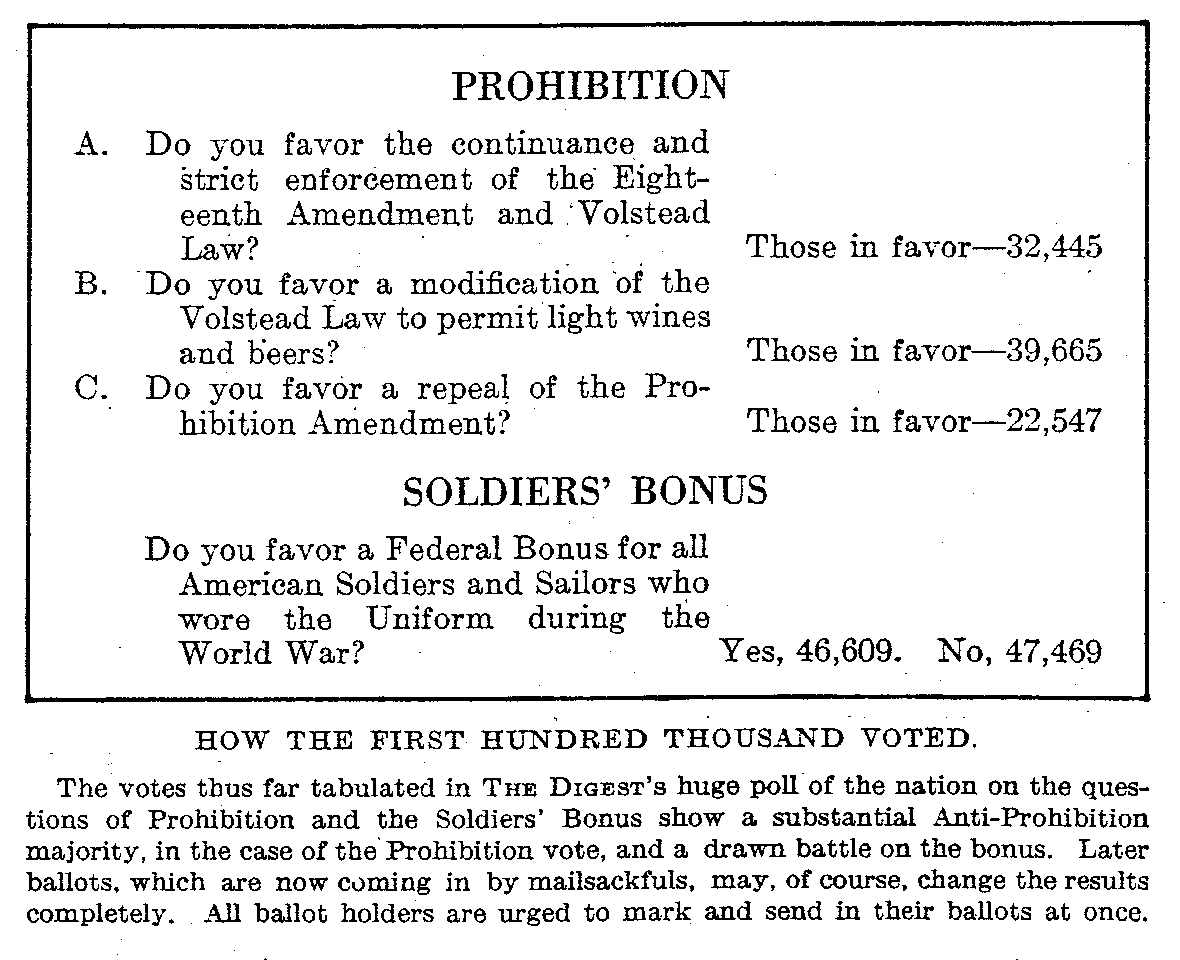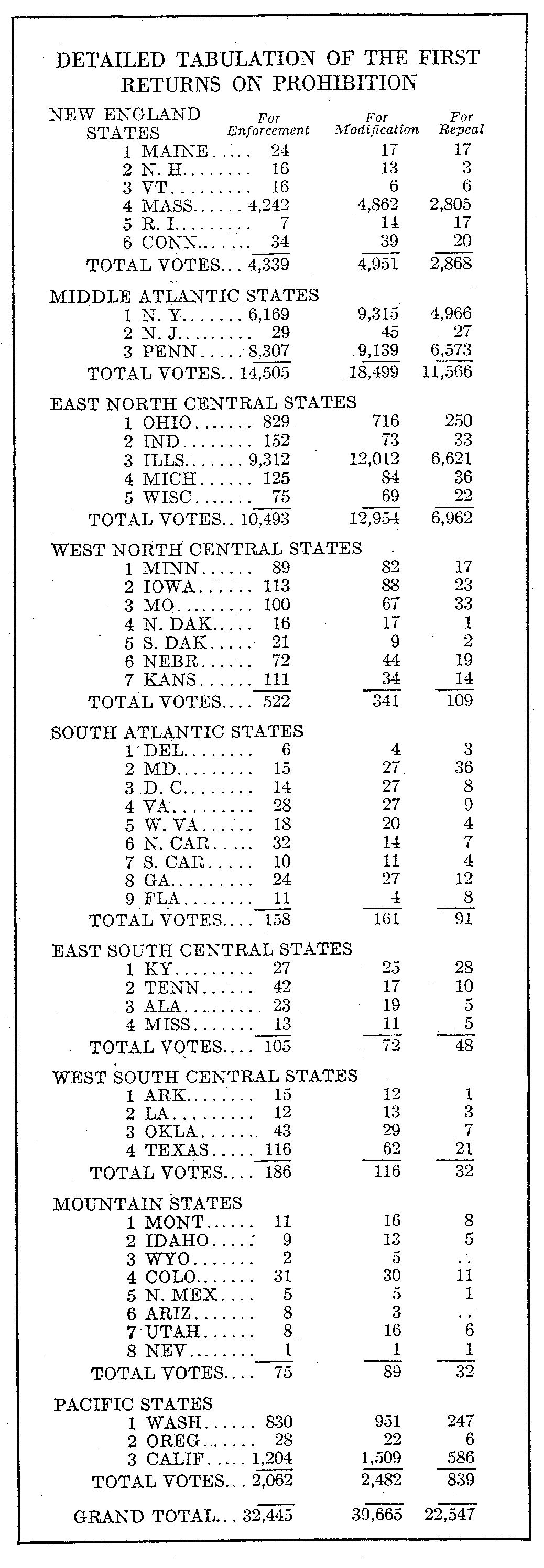First Returns in "The Digest's" Nation-wide Poll
Literary Digest
DAMPNESS SEEMS TO PREDOMINATE, and sentiment on the Soldiers' Bonus to be evenly divided; in the votes thus far tabulated in THE DIGEST'S poll of the nation. A large proportion of the 10,000,000 ballots in this huge poll have been distributed, and the returns are coming in by the thousands and tens of thousands. Approximately 100,000 votes have been counted and tabulated for the present issue, as shown in summary on this page and in detail on the page following. The most startling fact revealed by this first tally is that the early voters are against the continuance and enforcement of the present Prohibition, law by the proportion of nearly two to one.
On the other hand, the voters show themselves in favor of the Prohibition Amendment, or, in other words, in favor of some sort of a Prohibition law, by the even larger ratio of 72,000 to 22,500. The largest vote given to any of the three Prohibition questions favors the continuance of the Amendment, and is also in favor of a modification of the Volstead Law to permit the use of the less alcoholic drinkables. This formidable showing of the "moists" and "wets," however, is subject to several conditions that may entirely change the complexion of the table before the final count is in.

It is THE DIGEST'S policy, of course, to let the weekly summary of votes speak for itself, as other facts and opinions are permitted to speak for themselves through these pages. The table on the next page, and the summarized table in the center of this, are the real "story" of the showing of the Prohibition poll to date. Only such incontrovertible facts will be pointed out here as will serve to make the progress of the balloting more clear and interesting. It seems indisputable, for instance, that persons who vote for the repeal of the Prohibition Amendment would prefer modification to a continuance and enforcement of the present law. Thus, groups two and three may be combined in their opposition to a completely- "dry" On the other hand, persons who vote for a modification of the Volstead Law may be considered in favor of the present Prohibition Amendment, since they did not avail themselves of their opportunity to vote against it presented under question "C" on the ballot. The Amendment itself, therefore, is attacked only by a minority of fewer than one in three of those whose votes have been counted thus far. It. is the Volstead Law that is chiefly under fire.
Circumstances modifying the force of the large "moist" and "dry" vote shown by the first returns appear on examination of the table printed on the next page. It will be seen that in the driest States; those in the Middle West and South, the returns have not yet been tabulated in any volume. The West North
Central States; including Minnesota, Iowa, Missouri, the Dakotas; Nebraska and Kansas, are practically unregistered, but the votes which are shown in the table seem to indicate- that, in their attitude toward the liquor question, most of them may be considered definitely in the "dry" column.
In Kansas, for instance, the votes run 111 for strict enforcement, to 34 for modification and 14 for repeal of the Amendment. Thus the Prohibitionists, it is seen, out-number the combined "moists" and "wets" by almost three to one, a situation that is duplicated in no other State. Since this early vote was tabulated, a large number of returns have come in for Kansas and, even tho we may be anticipating next week's report of votes, it may be mentioned that this large vote is a striking verification of the conditions indicated by the small vote shown here. Kansas is for Prohibition, several thousand of her voters indicate, by approximately three to one. It is a significant fact, also, that this State has tried a dry regime for a number of years, and knows better than most others how it works.
California, it will be noted, is well up in the "moist" column, as numerous
humidity experts might have predicted. Illinois, where a recent investigation by
a newspaper association showed that bad booze was more expensive than anywhere
else in the United States, rolls' up a majority of more than two to one against
Prohibition. In this case, as well as in the case of the Middle Atlantic States,
however, where the majority against Prohibition is also large, it must be
pointed out that the city vote, which is almost always damper than the rural
vote, no matter what part of the country is considered, is received and counted
first. Even in nearby States, the small towns and country districts do not send
in their ballots so quickly as do the
( 6)

larger cities, as far away as Chicago. Aside from slower mail service, which may affect some districts, it seems to be true that the country dweller gives more thought to the subject before making up his mind. Another cause that may render later tabulations of returns drier than this first one may be found in the fact that the women's vote, by and large, comes in slower than that of the men. It is, of course, a much debated question whether women as a class are really more dry-minded than men, but the "drys" continue to claim the women's vote.
This first vote to be tabulated, it may also be remarked, is gathered largely from the telephone subscribers of the country, lists of whom furnished the chief address-list for mailing the earliest ballots. Lists from such sources, it has been argued, furnish a very representative vote, even tho they may not include many elements of the floating population, both those who live in hotels and those who live in boarding-houses or apartments without private telephones. A vote gathered .from telephone subscribers tends to be solid and conservative rather than radical. Later on, results of the polling of factories, where workingmen and workingwomen are given a chance to express their preferences, will be shown.
Approaching the Prohibition question from this "class" side, J. R. Hutcheson, writing - in The Christian Index, a Baptist publication of Atlanta, Georgia, submits that "the lower or common classes have just as much right to their ‘corn liquor' as the upper classes have to their `light wines and beer.' " The writer, who is strongly in favor of the enforcement of the present Prohibition laws, including the Volstead Act, attacks all faint-hearts among the Prohibition forces. He argues, in conclusion: "Just as long as a certain particular class of citizens of our country feel that the Prohibition Law should be amended so that they can have a mild intoxicating beverage, just so long will this law be treated as a joke among the more common and more numerous class of our people. The greatest barrier to the enforcement of this law is a few good people who feel that, be-cause liquor can not be put out in -a day, the law is a failure."
Representing the other side of the question: "Three women were on the streets of Toledo the other day," reports, The American Issue, the leading organ of the Prohibitionists, "wearing buttons inscribed
'WINE FOR WOMEN.' This is the slogan of a woman's auxiliary of a well-known wet organization which is working to legalize beer and wine."
At about this time, while THE DIGEST poll was getting under way, the Northern Baptist Convention, at its annual meeting in Indianapolis, went on record, reports The Union Signal, official organ of the National Women's Christian Temperance Union, "as strongly backing all aids to the enforcement of law, particularly of the Prohibition law." The Baptists are known as the largest Protestant denomination in America. The resolution which they passed reads as follows:
"We favor the strict and impartial enforcement of the Volstead law. The violation of the liquor laws, especially by members of the so-called influential classes, breeds a con-tempt for all constitutional and statutory authority and is a potent factor in the spread of the lawlessness which in many great centers of population menaces American institutions. We urge also the enforcement of all laws whose infringement imperils our right to a day of rest and worship. The commercialized Sabbath is a foe to the health, morality and happiness of the American people."
The present DIGEST poll gives the first opportunity ever given to the citizens of the United States to take part in a nation-wide vote on Prohibition. The importance of obtaining the widest and most representative registration of public opinion is the strongest possible argument for marking and returning all ballots at once.